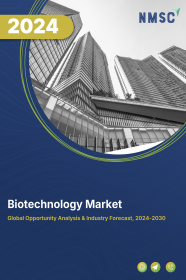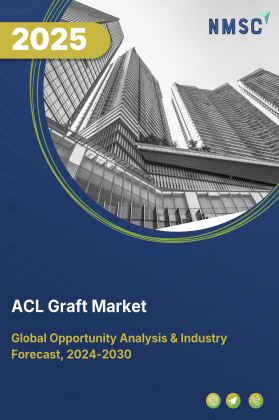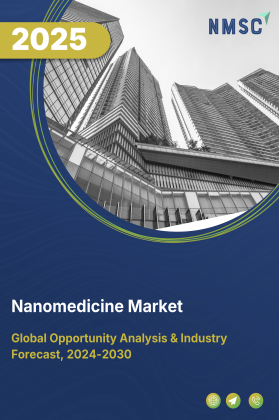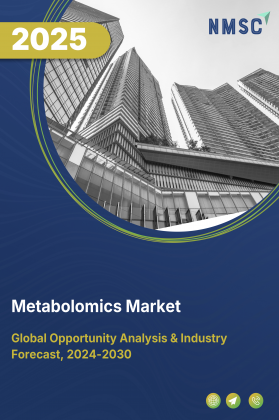
Biotechnology Market by Technology (Tissue Engineering and Regeneration, PCR Technology, Fermentation, Chromatography, DNA Sequencing, Cell-Based Assays, Nanobiotechnology, and Others), and by Application (Bio-services, Bio-agriculture, Bio-Industrial, Bio-pharmacy, and Bioinformatics) – Global Opportunity Analysis and Industry Forecast, 2024 – 2030
Market Definition
The global Biotechnology Market size was valued at USD 1047.45 billion in 2023 and is predicted to reach USD 2272.56 billion by 2030 with a CAGR of 11.8% from 2024 to 2030.
Biotechnology is an interdisciplinary field that uses living creatures, biological systems, or derivatives to improve or develop procedures and outcomes to produce healthcare products and therapies. It has a significant impact on a variety of industries that include medical and pharmaceuticals, genomics, and food & chemical manufacturing. It can be used to address a wide range of issues such as health and well-being, food & energy security, and environmental protection.
Market Dynamics and Trends
Increase in demand for biotechnology is attributed to rise in cases of cancer as biotech targets cancer cells present in the body more precisely, with less overall damage than traditional chemotherapies. For instance, in April 2021, Former Eli Lilly R&D lead Dr. David Bilenker, launched a new biotech company, Treeline Biosciences focused on cancer treatments. The company aims to develop innovative therapies to address the unmet medical needs in oncology. Additionally, Dr. Mark Engelman, the former oncology R&D lead at Novartis, has joined the company to further strengthen its scientific expertise. This partnership between experienced industry leaders signifies a significant advancement in the field of cancer biotechnology, potentially leading to groundbreaking discoveries and improved treatment options for cancer patients.
In addition, use of biotechnology in agriculture for protection of crops from chemicals is expected to drive the market growth. For instance, in February 2022, BASF and Orbia Ventures announced their investment in FortePhest, a biotech-based company that is developing a new technology to combat herbicide-resistant weeds and invasive plants. FortePhest is developing proprietary herbicides (H-Forte), which disrupts homeostasis of free amino acids in plant cells and selectively targets a weed’s meristems to stop development of shoots and roots.
However, developing new biotechnological products require significant investments in research and development, which can be a barrier for entry of smaller companies, hence restraining growth of the market. On the contrary, combination of 3D cell culture and bioinformatics has the potential to transform the biotechnology industry by accelerating drug development, improving patient outcomes, reducing animal testing, and advancing understanding of disease mechanisms. This factor is expected to create ample growth opportunities for the market in the coming years.
Market Segmentation and Scope of the Study
The biotechnology market report is segmented on the basis of technology, application, and region. On the basis of technology, the market is categorized into tissue engineering and regeneration, PCR technology, fermentation, chromatography, DNA sequencing, cell-based assays, nanobiotechnology, and others. On the basis of application, it is divided into bio-services, bio-agriculture, bio-industrial, bio-pharmacy, and bioinformatics. Geographically, it is analyzed across North America, Europe, Asia-Pacific, and Row.
Geographical Analysis
North America holds a predominant share of the biotechnology market and is expected to remain dominant during the forecast period. Presence of key market manufacturers such as Amgen Inc. and Pfizer, Inc. in the region propels the market growth. For instance, in July 2021, Amgen and Teneobio signed an agreement under which Amgen acquired Teneobio, a privately held, clinical-stage biotechnology company. Teneobio developed a new class of biologics called Human Heavy-Chain Antibodies for treatment of cancer, autoimmunity, and infectious diseases.
Furthermore, the introduction of bio-based agricultural products by the Farmers Business Network (FBN) in the United States is stimulating market expansion in the region. These products incorporate biological methods to enhance soil nutrient availability, provide essential nutrition, and safeguard plant vitality and well-being against adverse weather conditions or chemical pressures.
Asia-Pacific is expected to witness a swift rise in the market, owing to launch of scientific laboratories in the region, which are used for biotechnological; research and experiments. For instance, in June 2022, Tiangong space station was designed by China to be a versatile space lab capable of accommodating 25 experiment cabinets for scientific exploration, which supports experiments on life and ecology, biotechnology, and varying-gravity science research. Hence, such factors are expected to propel the market growth in the region.
Moreover, growth in experiment on gene editing technology also propels the market growth. For instance, in March 2021, Sanatech Seed in Japan launched the world's first genome-edited tomato called sicilian rouge high gaba tomato. This tomato was developed by using CRISPR-Cas9 gene editing technology. The tomato contains high levels of gamma-aminobutyric acid (GABA), which is an amino acid and is used to help in lowering blood pressure.
Competitive Landscape
The biotechnology industry includes various market players such as Novo Nordisk, AstraZeneca, Johnson & Johnson, Pfizer, Novartis, Sanofi, Abbott, Gilead Sciences Inc, GSK and Merck. These market players are adopting various strategies such as acquisition and investments across various regions to maintain their dominance in the global market.
For instance, in December 2021, Sanofi announced that it entered into an agreement to acquire Origimm Biotechnology GmbH, which is engaged in the discovery of virulent skin microbiome components and antigens from bacteria-causing skin disease, including acne. With this acquisition, Sanofi added first vaccine candidate against acne in its product portfolio.
Moreover, in January 2021, Pfizer Inc. announced that it invested $120 million in four clinical-stage biotech companies as part of its Pfizer Breakthrough Growth Initiative (PBGI). The purpose of PBGI is to provide financial support and grant access to Pfizer's scientific expertise, with the aim of ensuring the uninterrupted progress of promising clinical development programs that hold potential future strategic value for Pfizer.
Key Benefits
-
The report provides quantitative analysis and estimations of the biotechnology market from 2023 to 2030, which assists in identifying the prevailing market opportunities.
-
The study comprises a deep-dive analysis of the biotechnology market including the current and future trends to depict prevalent investment pockets in the market.
-
Information related to key drivers, restraints, and opportunities and their impact on the global market is provided in the report.
-
Competitive analysis of the players, along with their market share is provided in the report.
-
SWOT analysis and Porters Five Forces model is elaborated in the study.
-
Value chain analysis in the market study provides a clear picture of roles of stakeholders.
Biotechnology Market Key Segments
By Technology
-
Tissue Engineering and Regeneration
-
PCR Technology
-
Fermentation
-
Chromatography
-
DNA Sequencing
-
Cell-Based Assays
-
Nanobiotechnology
-
Others
By Application
-
Bio-services
-
Bio-agriculture
-
Bio-industrial
-
Bio-Pharmacy
-
Bio-informatics
By Region
-
North America
-
U.S.
-
Canada
-
Mexico
-
-
Europe
-
UK
-
Germany
-
France
-
Italy
-
Spain
-
Denmark
-
Netherlands
-
Finland
-
Sweden
-
Norway
-
Russia
-
Rest of Europe
-
-
Asia Pacific
-
China
-
Japan
-
India
-
South Korea
-
Australia
-
Indonesia
-
Singapore
-
Taiwan
-
Thailand
-
Rest of Asia-Pacific
-
-
Rest of World
-
Latin America
-
Middle East
-
Africa
-
Key Players
-
Novo Nordisk
-
AstraZeneca
-
Johnson & Johnson
-
Pfizer
-
Novartis
-
Sanofi
-
Abbott
-
Gilead Sciences Inc
-
GSK
-
Merck




















 Speak to Our Analyst
Speak to Our Analyst

























